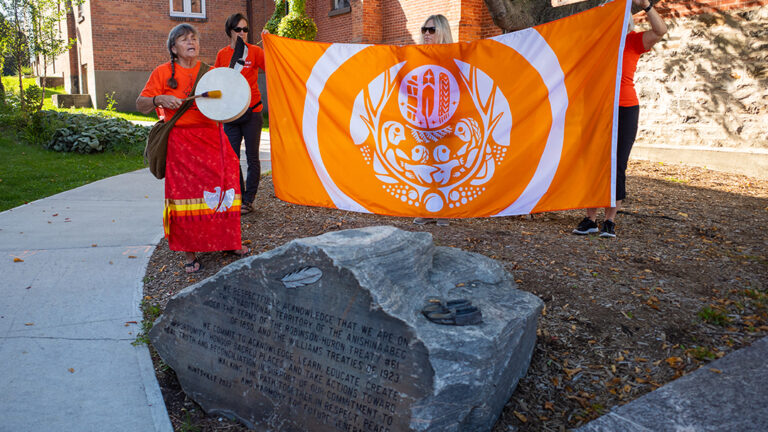New Brunswick has the weakest protections for tenants compared to anywhere else in the country and the pandemic has exacerbated the situation, with evictions and unscrupulous landlord practices going unchecked. Two organizations applied for funding from the Centre with the expressed intent of standing up for the region’s tenants, they were awarded funding on the condition they join forces.
On March 22, the New Brunswick government announced a one-year 3.8% rent cap as a response to the festering housing crisis and low vacancy. Although temporary, the decision is a small victory.
“Before the new legislation, it was almost like the Wild, Wild West out here. I would hear about [rent increases] of 25%, 50%, 75%. There was a building, it was over 200%,” says ACORN NB leader Vanessa Jones.
New Brunswick currently has the fewest protections for tenants in the country. There are no rent controls, no eviction prevention programs, and no right to maintain occupancy at the end of a lease agreement. The pandemic has exacerbated an already dire situation, with urbanites relocating to the Maritimes for lower cost of living.
ACORN has been actively organizing in the province for just over a year. The regional head organizer for ACORN Canada, John Anderson, says it is exciting to see the hard work paying off. Anderson is optimistic the provincial government’s announcement is the first step towards permanent, sustainable tenant rights.
“It’s significant that we were able to win and get a conservative government to introduce this [legislation, although] the trade-off to rent control [was a] multi-million tax cut to rental property owners.”
The government justified the reduction in provincial property taxes for rental property owners as a way to prevent operation costs being passed on to tenants.
Sector collaboration for sustainable change
The small win was made possible through serendipitous collaboration.
When ACORN CANADA and the NB Coalition applied for funding from the Centre with the expressed intent of standing up for New Brunswick tenants, they were awarded grants on the condition they join forces.
ACORN NB, an offshoot of ACORN Canada, is volunteer-led with a focus on door-knocking and grassroots leadership, while New Brunswick Coalition for Tenants Rights advocates for law and policy reform and provides legal information to tenants—a perfect fit. The Centre awarded $48,000 and $149,905 to each respective group.
“ACORN has been instrumental in protests, demonstrations, doing door-to-door work and mobilizing tenants. Our work has been very focused on producing reports and research pieces. The two main projects we are doing with the [Centre’s] funding is the tenants advocate service and a research project,” says Aditya Rao, a founding member of the New Brunswick Coalition for Tenants Rights.
The Tenants’ Advocate, Jael Duarte, provides legal information to tenants across New Brunswick in three languages—English, French and Spanish. In the absence of a legal clinic system, tenants in New Brunswick were left with nowhere to turn for tenant-focused help until the service began.
The research project on tenant experiences in New Brunswick aims to fill a data gap in the province. According to the Coalition, government policy has been formulated by reliance primarily on landlord associations with almost no objective research. The Centre-funded project is being conducted in partnership with the University of New Brunswick Saint John (UNBSJ) and St. Thomas University and has been approved by the Research Ethics Boards of both universities.
Anderson adds, “[Simply put] they’re doing the important legal advocacy and policy research work and we compliment that by doing outreach and engaging working-class tenants. Both organizations stick to what they have expertise on. That puts us in the best position to make big changes for New Brunswick tenants.”
The work ahead
However, much work remains to be done. The legislation doesn’t broach evictions and other commonly experienced housing right violations. Just a few weeks ago, the Moncton Real Estate Investing Organization hosted an online roundtable discussion with dozens of local landlords swapping creative ways to skirt the restriction, with renovictions and special leases identified as potential rent-cap loopholes.
Jones isn’t a stranger to dubious rental tactics: her rent was doubled when her building was bought by a property management company.
“They started renovations and drilled 39 holes in the walls. [They] started the work but didn’t complete it. It was uncomfortable for me to live in and there were bugs crawling out of the walls.”
Jones moved out of her apartment building soon after, but the experience was the catalyst to her tenant’s rights advocacy with ACORN. The funded project focusses on engaging new tenants, seeking out opportunities to develop their leadership skills and build new leaders and get more people involved—which is ultimately what is needed to win.
Although New Brunswick has a Residential Tenancies Tribunal which upholds and enforces the province’s Residential Tenancies Act, the Act still does not have basic protections such as rent control. The Tribunal tries to resolve conflicts between landlords and tenants, but as Rao points out, its powers are very limited.
“It’s a quasi-judicial tribunal that doesn’t render decisions in the manner that we’re used to in other jurisdictions. In fact, they’re just a mediation service in some ways. For them, it is a success when they convince a tenant to take a 55% rent increase instead of 100% rent increase.”
All the reason to keep advocating. Rao says the Centre’s funding is instrumental to permanent sectoral change.
“I don’t think I can overstate the fact that were it not for the Centre’s grant, none of this would be possible,” says Rao. “[It] made it possible to hire a tenant’s advocate [who provides legal information] and develops resources: we have 16 webinars coming out, this year alone, helping folks to understand their rights.”
Also, the grant has helped shift the narrative in the public sphere from one that was entirely in favour of landlords to more balanced reporting.
Jones says, “Before, we were all separated and alone, now we’re coming together as tenants and we’re getting a stronger voice in the community.”



